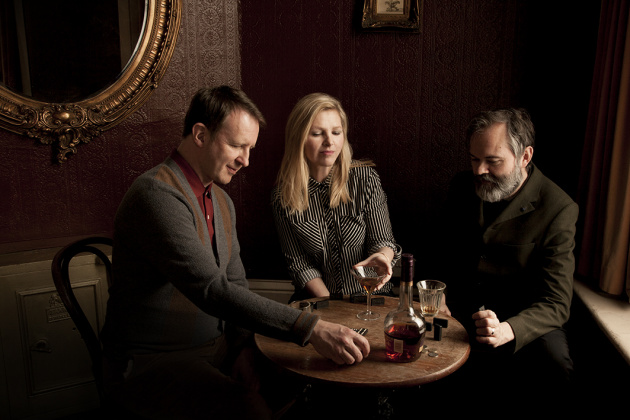A select number of bands that started life in the 1990s have kept making music, and kept getting better. The idea of a group as a lifetime commitment, band members growing and changing over decades alongside their audience, is a recent cultural concept. From the 1960s, bands either imploded early, or staggered on to diminishing returns. Later, they began reforming to cash in on nostalgia. But musicians from a later generation are starting to show that looking forward can be better than looking back. Perhaps David Bowie’s transcendent final albums set the scene. Recently, Suede and The Cure have made some of their best work for fans who need it now even more than they ever did.
For Saint Etienne, the 2020s are shaping up to be a good decade. Their last album, 2021’s I’ve Been Trying to Tell You, was surprising, bewitching and one of their best. Their previous album, Home Counties, was the record every Saint Etienne fan wanted them to make: the perfect mix of glorious pop and suburban psychogeography. I’ve Been Trying to Tell You was the album no-one knew they could – a sample symphony which opened up all sorts of possibilities. The Night, their twelfth studio album, takes this newly found freedom forward another step. It condenses and defocuses the more abstract and instrumental themes of I’ve Been Trying to Tell You. Though it is relatively short, the album isn’t full of classic three-minute pop songs (although the band describe their next album, planned for summer 2025, as ‘pop’). Instead, it distils the themes that have defined their twenty-five-year career into hallucinatory nuggets, as though they are contemplating them from low Earth orbit, and makes them lusher, deeper and woozier. It is like listening to Saint Etienne in a dream.
The band had a clear concept for The Night: to make the kind of music you listen to with your eyes closed – a ‘headphone album’, as Bob Stanley describes it. The album was made to provide solace, too, connecting back to what Benjamin Myers, in his accompanying sleeve notes, identifies as the ancient tradition of humans listening to the sounds of nature to calm and console themselves. Rain runs through the record from the opening track, ‘Settle In’, reappearing in the background of various tracks as gentle white noise blocking out the noise from inside and out. ‘Settle In’ is a sort of encapsulation of Saint Etienne’s early career, with Sarah Cracknell’s calm voice intoning “When you’re twenty or twenty-one you have so much belief… All roads lead to here.” She takes us from the infectious enthusiasm of 1991’s Foxbase Alpha, a record about being young in London, to where they, and we, have ended up.
Saint Etienne, fascinated by the qualities of place, are specific about where the album was recorded, in Bradford and Hove. The Night was produced in collaboration with Bradford producer Augustin Bousfield, who also plays guitar. The result is a deliberately enclosed sound, reflecting the nocturnal bedroom headspace the band was aiming for. It is reminiscent of the atmosphere conjured by Chris Morris’ late night Radio One series, Blue Jam, in which reality is heightened, internalised and strange. The Night is a headphone album. It opens with fragments of pub conversation, then an opening door, footsteps, the journey home and a retreat into the kind of Saturday night thoughts that make everything seem oddly clear.
By deconstructing their identity, Saint Etienne have created a coherent sequence of remarkable songs which sound like everything else they have done and nothing else, at the same time. It is a very impressive achievement. ‘When You Were Young’, for example, is a ghost of a track, like the Saint Etienne of Tiger Bay heard in a fog. The album slips through reflective vignettes, such as ‘Half Light’, which evokes the dusk, and ‘Through the Glass’, which expresses the feeling of falling asleep, unsure whether what you see is real or imagined. This unmoored, half-conscious state persists through the album unleashes memories and emotions which are somehow detached. ‘Nightingale’ is a gorgeous lullaby from a fable. The wordless ‘Northern Counties East’ hums with the atmosphere of a particular place and time, but names and details are just out of reach. On ‘Ellar Carr’ the words come in fragments, piecing together a Bradford memory.
Amongst the ambient drowsiness are moments of surprising clarity. ‘Preflyte’ is about being a parent letting a growing child go. It is an entirely heartfelt song with a properly moving performance from Sarah Cracknell. Ethereal backing vocals and a melting guitar part tie it into the album’s soundscape, but the vocals float bell-like over the top. A brief track, ‘Wonderflight’, then regrounds the album, with a Cracknell narrative describing a night bus home from the pub, and putting a record on in the dark. It reminds us where we are, back in the here and now. It cues up the album’s longest track, ‘Hear my Heart’, the culminating reverie with repeating vocal and guitar loops – the point in the evening when you just want to listen to the same thing over and over again.
Bob Stanley says that The Night will “gently wash away the stuff in your head that keeps you awake at 2am.’ Everyone needs that, and Saint Etienne provide a gorgeous, multi-layered sound world to assist. Sometimes it feels as though the band are talking directly to the listener, one-to-one, with the knack they have always had for communication. Their music is treasured because they have an uncanny ability to make uncool people feel cooler, lost people feel found, and disconnected people feel that they belong. A lot of people are going to enjoy listening to The Night. But it is not cosy: Saint Etienne are better than that. The final track, ‘Alone Together’ ends with the warning that “Time flies / it slips and slides” – the shared beat to all our lives.


